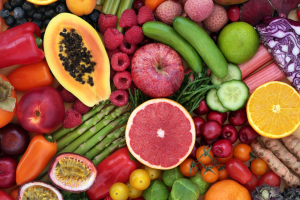The future is here: AI meal planning. Say goodbye to spending hours putting together a plan, meticulously tracking calories and macros, writing shopping lists and repeating. AI is capable of doing all but the cooking, so you can enjoy food again.
AI meal planning: The benefits
Imagine having a personal nutrition expert who knows your metabolism, food preferences and health goals who is available 24/7 to offer you support, guidance and advice. No, it’s not too good to be true with AI meal planning.
You don’t need to be a tech wizz or have an in-depth understanding of nutrition to benefit!
1. Guarantee a balanced diet
A balanced diet is crucial for maintaining health and preventing illness or disease. AI meal planning systems focus on this by integrating data from various nutritional databases to create meals that include all essential nutrients.
It automates the process of planning each meal to ensure it includes carbohydrates, proteins, fats, vitamins, and minerals in appropriate quantities. For example, AI could suggest a breakfast rich in protein and fiber paired with essential vitamins, helping individuals meet their daily dietary requirements naturally.
2. Stay up to date with your current and future goals
Diets need to change over time as your goals shift. Whether that’s due to age, health diagnosis, injury or fitness goal, AI can easily keep up. It’s able to adapt and tailor your meal plan quickly and easily to fulfil your evolving needs.
3. Reduce nutritional guesswork
Unless you’re a qualified nutritionist – or have plenty of time to dedicate to research – coming up with meal plans that meet your macros, goals, and include any preferences can be difficult. AI takes the hassle out of calculating the amount of calories, carbohydrates, protein or fat in each meal so you can just enjoy your food knowing it’s helping you to achieve your goals.
AI meal planning apps offer instant access to the nutritional breakdown of each recipe, allowing you to make more informed dietary decisions without the legwork.
4. AI meal planning saves time
One significant advantage of AI meal planning is its ability to automate mundane tasks, such as meal scheduling and creating shopping lists. This is a time-consuming process for one person, yet AI can generate weeks’ worth of meals and corresponding shopping lists in just seconds.
5. Ensure consistency
AI meal planning reinforces consistency by creating a structured approach to eating. The plans can remind users of meal times, suggest variations to prevent diet fatigue without compromising on nutrient intake, and minimise the chances of reverting to unhealthy eating patterns.
AI meal planning: The cons
So there are plenty of benefits to using AI meal planning apps, but what about the downsides?
There are only a handful, including:
- Cost barriers
AI meal planning apps may not take into account the availability or cost of ingredients, whilst the app itself could be an expense as many run on subscription models.
- Food waste risk
If ingredient overlap between meals isn’t accounted for, users might buy more than needed, leading to food waste.
- Limited flexibility
AI-generated plans may not account for last-minute changes, like social events or availability of ingredients. It may also not factor in an individual’s lifestyle or traditions.
The key thing to remember is that AI meal planning boasts plenty of benefits that outweigh downsides in many cases, but it’s important to find the right app for you and your needs.
ChatGPT or AiMP for Metabolic Balance?
The first thought that comes to mind when most people think about AI is ChatGPT – but how helpful is this when it comes to following the Metabolic Balance diet?
The key difference between ChatGPT and AiMP is that we’ve programmed AiMP to follow and understand the eight guidelines and four phases of Metabolic Balance.
ChatGPT isn’t good enough, and doesn’t stick to the guidelines – it’ll add ingredients or seasonings that aren’t on your plan, or doesn’t factor in how the different phases impact your meal plan.
You upload your unique meal plan and individual food list, and AiMP creates a working meal plan using this data – there’s no worry that it’s incorrect.


